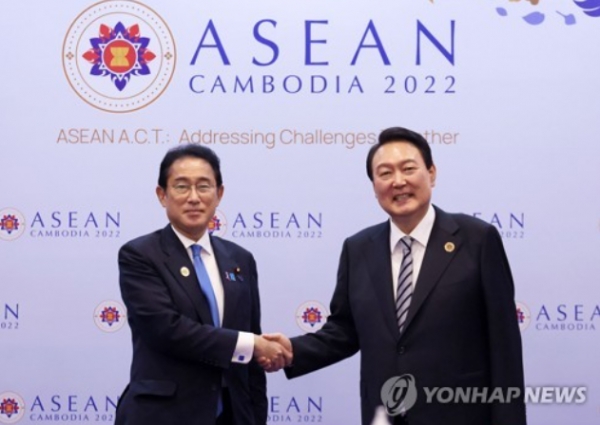
[이슈밸리=사설] 윤석열 정부가 여론 악화를 각오하고 일제 강제징용 피해자 배상금을 지급하기로 했지만, 막상 일본 정부는 우리 정부의 노력과 달리 기세등등하게 나오고 있다.
하야시 요시마사 외무상은 7일 “일본 정부는 1998년 10월 발표된 한·일 공동선언(김대중-오부치 공동선언)을 포함한 역사 인식에 관한 역대 내각의 입장을 전체적으로 계승했다”고 답했다. 이 선언에서 오부치 게이조 당시 일본 총리는 ‘통절한 반성과 마음으로부터의 사죄’를 공식 표명했다.
윤석열 정부는 ‘지지율 하락’과 ‘굴욕적 조처’라는 비판을 감수하며 일본 측에 대폭 양보했음에도 일본은 역대 내각을 계승하겠다는 두루뭉술한 입장일 뿐, 직접 사죄와 반성이란 언급은 하지 않았다.
또한 이러한 입장 발표도 기시다 후미오 총리가 직접 나선 것이 아니라 하야시 외무상이 공식 기자회담도 아닌 차담회 형식을 빌려 밝혔다. 사안을 가볍게 보고 있다는 뜻이다.
특히, 반도체 수출규제와 관련해서는 앞으로 한국 정부의 자세를 보고 조치하겠다고 밝혀 논란을 키우고 있다. 기세등등은 이럴 때 쓰는 말일 것이다.
우리 국민은 이번 윤석열 정부의 강제징용 배상금 관련, 역대 정부와 비교해 처음 있는 일이라 다소 어리둥절하다.
윤 대통령 말대로 지지율 10% 하락을 각오하면서까지 이번 일을 추진한 것은 당면 문제인 북한 핵 위협, 중국 군사력 팽창, 수출규제 등 군사·외교·경제에서 한·미·일 삼각 공조가 반드시 필요하기 때문이다.
문제는 윤석열 대통령의 뜻대로 일본 정부가 순수히, 절차대로 응해주면 다행이겠지만, 일본의 본질은 윤석열 정부가 생각하는 것과 매우 다르다는 점이다.
역대 정부도 정권 초반에 일본과 관계 회복을 위해 다양한 노력을 했다. 미국의 압박으로 김대중, 노무현, 이명박, 박근혜 정부도 예외는 없었다.
하지만, 일본 정부는 겉으로는 응하는 것 같다가도 독도문제와 역사문제 등을 스스럼없이 왜곡했고, 야스쿠니신사 참배로 한국 정부와 우리 국민에게 큰 실망을 안겼다. 굳이 어제오늘 일은 아니다.
늘 좋을 듯 하나, 뒤통수를 친 것은 한국보다는 일본이었다.
따라서 이번 윤석열 정부의 강제징용 배상금 문제도 어떻게 결론 날지는 알 수가 없다. 다른 동맹들처럼 하나를 주면 둘, 셋을 주는 동반자적 우호 관계가 지속되면 금상첨화겠지만, 역사적으로 일본은 늘 우리의 바람과는 거리가 먼 행동을 일삼아 왔다.
이번 윤석열 대통령의 과감한 승부가 제대로 먹히면 다행이지만, 일본 정부가 후속 조처를 더디게 하거나, 아예 취하지 않는다면 윤석열 정부에 대한 지지도 하락은 물론이요 그 파장이 내년 총선에 악영향을 끼칠 수 있다는 것은 불가피해 보인다.
지금 강제징용 배상 현안과 관련해서 한·일 양국의 외교 카드는 일본 정부가 쥐였다고 볼 수 있지만, 그들 역시 이번 기회를 놓치면, 대한민국과 관계 정상화가 영영 쉽지 않을 것을 각오해야 할 것이다.
지금 모든 과정을 조 바이든 미국 행정부와 유럽 주요 국가들이 유심히 지켜보고 있다는 것을 알아야 한다.
기시다 정부가 윤석열 정부와 협력 없이도 “괜찮다”고 오만한 생각을 한다면, 일본이 그토록 추앙하는 미국과 유럽은 일본을 향해 “너희가 그러면 그렇지”라고 평가 절하할 것이다.
[Editorial] Whether the "Korea-Japan Friendship Relationship" will continue is up to Kishida.
[Issue Valley = Private Story] The Yoon Suk Yeoln government has decided to pay compensation for victims of forced labor in Japan in preparation for worsening public opinion, but the Japanese government is coming out in force, unlike the Korean government's efforts.
Foreign Minister Yoshimasa Hayashi replied on the 7th, "The Japanese government has inherited the positions of previous Cabinet members on historical awareness, including the Korea-Japan Joint Declaration (Kim Dae Jung-Obucci Joint Declaration) announced in October 1998." In the declaration, then-Japanese Prime Minister Keizo Obuchi officially expressed his "deep remorse and heartfelt apology."
Despite the Yoon Suk Yeoln government's big concession to Japan at the risk of "falling approval ratings" and "humiliating measures," Japan is only a vague position to inherit previous cabinet, but it did not mention direct apology and reflection.
In addition, Prime Minister Fumio Kishida did not directly announce his position, but Foreign Minister Hayashi borrowed the form of a second meeting, not an official press conference. This means that the issue is being taken lightly.
In particular, regarding semiconductor export regulations, it is raising controversy by saying that it will take measures based on the Korean government's attitude in the future. The term "giseok" is probably used at times like this.
The Korean people are somewhat puzzled because it is the first time compared to the previous government in relation to the compensation for forced labor by the Yoon Suk Yeoln government.
As President Yoon said, Korea, the U.S., and Japan's triangular cooperation is essential in military, diplomatic, and economic issues such as North Korea's nuclear threat, Chinese military expansion, and export regulations.
The problem is that the nature of Japan is very different from what the Yoon Suk Yeoln government thinks, although it would be fortunate for the Japanese government to respond purely and according to procedures as President Yoon Suk Yeol wishes.
Previous governments also made various efforts to restore relations with Japan at the beginning of the administration. Under U.S. pressure, the governments of Kim Dae Jung, Roh Moo Hyun, Lee Myung Bak, and Park Geun Hye were no exception.
However, the Japanese government seemed to respond, but it freely distorted the Dokdo issue and historical issues, and the visit to the Yasukuni Shrine disappointed the Korean government and the Korean people. It's not something that happened yesterday or today.
It seems always good, but it was Japan rather than Korea that hit the back of the head.
Therefore, it is not known how the Yoon Suk Yeoln government's compensation for forced labor will also be concluded. Like other alliances, it would be the icing on the cake if the partnership of giving one or two or three continued, but historically, Japan has always acted far from our wishes.
It would be a relief if Yoon Suk Yeol's bold victory worked, but if the Japanese government slows down its follow-up or does not take any action, it will inevitably lose support for Yoon Suk Yeol's government, as well as that impact could adversely affect next year's general elections.
The Japanese government's diplomatic card on the issue of compensation for forced labor can be seen as a rat, but if they miss this opportunity, they will also have to prepare that normalization of relations with the Republic of Korea will never be easy.
You should know that the entire process is now being watched closely by the Joe Biden administration and major European countries.
If the Kishida government thinks it's okay without cooperation with the Yoon Suk Yeoln government, the U.S. and Europe, which Japan admires so much, will devalue Japan, saying, "If you do, then so."


